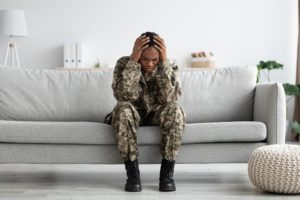When someone serves their country in the Armed Forces, they’re typically lauded as heroes. Unfortunately, they may not always feel this way. The epidemic of veterans and suicide continues to prove that our service members are at significant risk. Understanding these issues is a paramount concern, but a focus on the individual is also necessary.
not always feel this way. The epidemic of veterans and suicide continues to prove that our service members are at significant risk. Understanding these issues is a paramount concern, but a focus on the individual is also necessary.
At Transformations Treatment Center, we’ve seen countless veterans face difficulty adjusting to civilian life. The struggles they deal with daily are many, but they don’t have to face these alone. The veteran suicide rate is a national tragedy, but help is available for those who seek it. Contact us today to learn how we can help you take your life back.
The Link Between Veterans and Suicide
People frequently hear about the risk of suicide that veterans face. In many cases, though, they don’t recognize the true scope of the problem. Every day in America, 20 vets die by suicide. Around three-quarters of these individuals aren’t receiving mental health treatment or drug rehab from a VA medical center. Sadly, this means many of them never stood a chance.
While veterans only make up 7% of the American population, they account for 20% of all suicides in the country. In fact, the suicide rate for vets is about 1.5 times higher than that of the civilian population. This is nothing new, and the military has taken strides to fight the epidemic. This focus includes the development of training mandates and VA outreach programs.
Unfortunately, these efforts seem to have little effect on veterans and suicide rates. Instead, recent years have seen these numbers increase among vets. This is a heartbreaking trend that proves just how pervasive the problem has become. By understanding its underlying causes and potential treatments, though, we may be able to reverse course.
Why Do Veterans Have Higher Suicide Rates?
The connection between veterans and suicide rates is well-documented. Unfortunately, there is no single cause behind this issue. This means there’s also no single solution. Understanding what leads to this outcome, though, is the first step in fighting back. Once you recognize the underlying issues, it’s possible to work on a solution.
Traumatic Experiences
Veterans are at risk for experiencing traumatic incidents throughout their service. From witnessing friends dying to sexual victimization, the Armed Forces are a metaphorical and sometimes literal minefield. Any form of psychological trauma increases the risk of mental health issues, drug abuse, and suicide.
Physical Injuries
The rate of physical injuries in the military is high. Painkillers are often the go-to treatment for such injuries. Unfortunately, this can lead to dependency on the drugs. And since about one-third of Army suicides involve drug or alcohol use, physical injuries can be the start of a dangerous road.
High Divorce Rates
Combat veterans are 62% more likely to see their first marriages end in divorce or separation. Unfortunately, divorced individuals have a suicide rate 2.4 times higher than that experienced by the married population.
“Just Deal With It”
There’s a pervasive belief in the military that service members should just “tough it out” when they have issues. This far too often leads to veterans not seeking help when they need it. It’s time for this dangerous attitude to end.
You Can Find Help
Each of these issues can lead to an increased risk of suicide among veterans. This list is far from exhaustive, though, so don’t fall into the trap of thinking you should handle your problems on your own. At Transformations Treatment Center, we’ve got your six. Contact us today to learn how we continue to help former service members move forward with healthy lives.
Veteran Suicide Prevention Through Treatment
The combination of substance abuse disorder, PTSD, physical injuries, and other military stressors create a difficult situation. We’re losing American heroes every single day to suicide, and the government’s efforts seem to have little effect. Fortunately, decreasing the risk of self-inflicted injury on an individual level is more manageable.
At Transformations Treatment Center, the Help for Our Heroes program focuses on the unique needs of veterans. Here are just a few of the services you can expect to find at our facilities:
- Rebuilding family relationships
- Treatment for military sexual trauma (MST)
- Suicide awareness and prevention
- Medical detoxification
- Anxiety management
- Grief and loss healing
- Trauma management and resolution
- Individual cognitive behavioral therapy
- Group therapy and peer support
At Transformations, these are just the tip of the iceberg. National veteran suicide rates are an American failure, but each individual death is a tragedy in its own right. If you’re a vet dealing with mental health or addiction issues, help is available if you want it. Don’t wait. Reach out today.
You Don’t Have to Fight This Battle Alone
The struggles faced by veterans are very real issues. Unfortunately, they often lead to tragic and irreversible outcomes. Even as the federal government works hard to reduce veteran suicide rates, we’ve seen numbers continue to climb in recent years. While America may have difficulty solving this problem, dealing with it on an individual level is a simpler prospect.
At Transformations Treatment Center, we recognize the difficulties experienced by those who served America. That’s why we created the Help for Our Heroes program with vets in mind. Veteran suicide rates are certainly disheartening, but if you need help, it’s just a phone call away. Contact us today to learn how we can help you take control of your life after service.
Sources
National Institute on Drug Abuse
https://www.drugabuse.gov/publications/drugfacts/substance-use-military-life
Psychology Today
Veterans View
http://www.veteransview.com/news/combat-vets-much-more-likely-to-divorce-separate
Military Times
